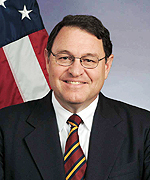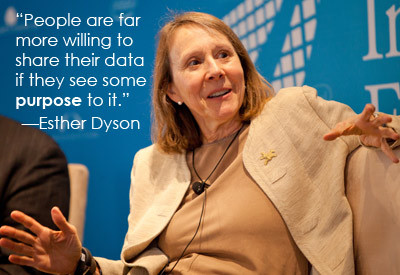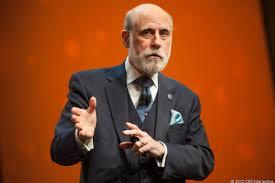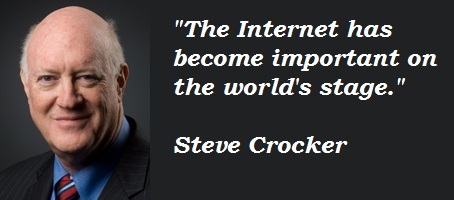
Who in the world could possibly think this was a good idea?
"Let's give away oversight and regulatory authority over the Internet to other countries," they must have shrieked with élan.
I'm wondering who first said those words. (And why their career trajectory wasn't an immediate, supersonic nosedive resulting in a big, smoldering crater.) It sounds so stupid. I wouldn't need any Power Points or Gantt charts to quickly recognize it for what it is: idiotic.
And not just any 'plain vanilla' type of idiotic either, but the really dangerous kind.
Perhaps it is I who am the idiot? I've been wrong so many times before.
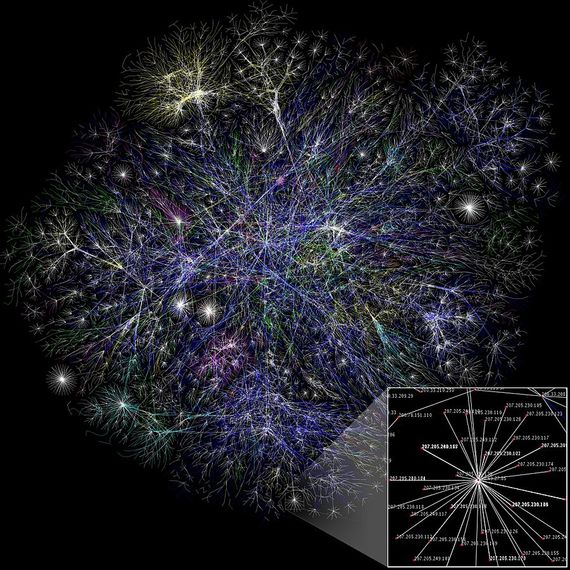
A map of the Internet Backbone: "Each line is drawn between two nodes, representing two IP addresses. This is a small look at the backbone of the Internet."
None of us ... and I mean no human being on Earth has any idea of how big this thing is; how enormous, complicated and complex the Internet has become. Give it away? Hell, we don't even understand it yet.
I'm wondering how the idea first came about, how it was surfaced and discussed. Were administration people searching for new "progressive ideas," or what? Was there a task force assigned? Who were the principals involved?
This is insane: the pure and simple idea of ceding fundamental control of the Internet--an American creation, development project and asset--to a quasi-UN type governing committee made up of as President Obama's Commerce Department shilled, "a global multi-stakeholder community," must be stopped. It cannot happen under America's crucial 'national security interests.' That's only one reason but there are oh! so many more.
For anyone not paying attention yet: As the insufferably tech-clueless Washington Post said with obfuscated glee, "U.S. officials announced plans Friday (March 14, 2014) to relinquish federal government control over the administration of the Internet." There it is ... BAM.
The newspaper then went on to opine, "Pressure to let go of the final vestiges of U.S. authority over the system of Web addresses and domain names that organize the Internet has been building for more than a decade and was supercharged by the backlash last year to revelations about National Security Agency surveillance." What pressure? Where? And from whom? The Yemenis?
And what "final vestiges?" Why don't we still have all the vestiges? Who's been giving these important vestiges away without informing the American people?
From my recollection, there was nothing "supercharged" at all about how the NSA should effect the Internet; rather, what the NSA fiasco did and should still be doing is supercharging the strong public' outcry against the U. S. government's use of the NSA to spy on Americans. And, the Big Tech companies like Google, Yahoo, Facebook, Twitter and others' unconstitutional giveaway to illegal government requests for OUR INFORMATION without a proper warrant, is absolutely unacceptable and outrageous.
So WashPo is not the Internet's friend. The Washington Times had a much more worried piece that was more aligned with my viewpoint. Critical articles of this dopey idea can be found here, here and here. 113,000 people have signed a petition opposing the Obama plan. Even Bill Clinton criticized President Obama on this one, a very rare activity for Presidents indeed.
But there's another core principle involved here: Intellectual Property Rights and America protecting its national assets. Would anybody even mutter under their breath the idea that we give up American control of our "Strategic Petroleum Reserve?" Of course not, because it would ruin the US national security and put Americans in jeopardy. And it's ours. We own it.
There can be no argument whatsoever that the Internet is the single, most important and valuable asset on planet Earth. The Internet gives a voice to suffering people around the world when they are in danger and need for others to know. The Internet has been under attack since the beginning from China, especially; but also Russia; and most of the Middle East countries where the populace is silenced and lethally controlled for political fun and profit. The 'Arab Spring' phenomena were born on the Internet; though ultimately miscarried it still highlighted the superb power of this great, global communications system. And some idiot(s) wants to give the rest of this crazy world control over it?
And the Internet is increasingly, the center of all commerce. To even consider giving away or relaxing or "transitioning" or whatever they're calling it today, the controls, regulations, oversight, policy-making or America's tight reins on the Internet is inconceivable. Though, apparently, somebody has conceived it and it looks like "Rosemary's Baby."
Who in the current US government is smoking something funny? What elected official, patronage employee or presidential adviser could possibly think this was a clever idea? And what about the "notion" that they should be instantaneously and irreversibly fired? How about that little notion?
Look here: no matter our political proclivities; whether you the American reader are a Conservative/Liberal, Marxist/Leninist, Independent, Libertarian or whatever, we have to agree that the Internet is American property that we've been exceedingly liberal and generous with up until this point. But we retain full possession and control over our property and are willing to die for our rights.
So who was it that had this singularly worst idea of all time?
For all outward appearances, it looks like it might be the President's hand-selected, fellow-Chicagoan, Lawrence Strickling who is responsible for this grand idea. Strickling said, "The timing is right to start the transition process." Although, the President surely had to give his stamp of approval; this smells very much like the floating of a 'test kite' to see how it's received by Americans. If we have any sense at all (and I believe we do!), then we will tell this administration to 'go fly a kite' on this one and have them backpedaling at warp speed.
Let us take a look at Mr. Strickling's title, shall we? Should be simple enough. Wait, it's not. His title is "Assistant Secretary for Communications and Information and Administrator, National Telecommunications and Information Administration (NTIA), U.S. Department of Commerce." Well, I'm impressed but how does that all fit on his business card? This gobbledygook could be part of the problem with transitioning the Internet into others' hands: there are so many unintelligible titles and acronyms for myriad organizations involved in this issue, nobody can make any sense of it much less reach a rational decision. USDOC, NTIA, ICANN, IANA and that title would confuse anybody to death. I've found, that where this rampant use of acronyms and titles is present, there is not--and cannot be--a government with a laser-like focus on efficiency. Quite the opposite.
Another task in Strickling's job description is, to me, highly suspicious because of the possibility for misfeasance. He's given away another valuable government gift: $4.7 billion in "broadband stimulus funding." The inclusion of Strickling on the list of "Most Powerful People in Wireless" also worries me. Why is a government bureaucrat and old friend of the President on a list of most powerful people? Oh, I guess that's obvious; it's because he's given away $4.7 billion dollars and is likely to give away more.
And, is the timing really right as Strickling says? Coming right on the heels of the FCC "Ending Net Neutrality?" Is it really a good idea to go racing ahead with more dreadful decisions? And aren't there more pressing "transition" processes that need to be made on the Internet first?
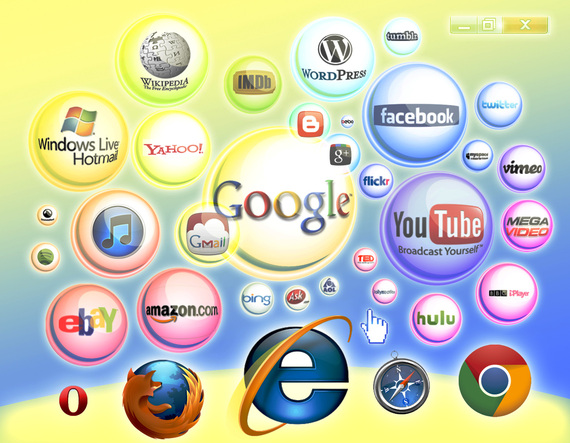
Right now, the Internet is being dominated by the big tech brands. When will the "little guys" ... small businesses be able to have their brands noticed?
Up until now dear reader, these have been my own, personal opinions. Well, no more.
There are two people in the world who are the most qualified to comment cogently on what I am calling this "fiendishness": Esther Dyson & Vint Cerf.
Esther Dyson ("TechStar Interview" 12/28/11), a revered investor, energetic entrepreneur, board-member and tech guru is well-respected for her role in the early development of the Internet and through her board membership of ICANN. Dyson has been a longtime 'minder of the Net' at ICANN having been the founding chairwoman there, and it is this Internet Corporation for Assigned Names and Numbers which is at the very center of the current maelstrom.
When I asked Dyson about what I'm calling the "Internet Giveaway," she disagreed. "It's not ours to giveaway. We were protecting it. It's ours to protect. The whole point is to avoid oversight. The ICANN that governs least, governs best."
"The problem is that governments are trying to use the Internet to exert control rather than protect it from control. The Internet is too vulnerable to government and corporate interests, and it needs to be more for the broader public."
Though Dyson and I disagree on some details and I would always defer to her greater Internet wisdom, we do agree fundamentally that this is a bad idea and must be stopped. "Listening to public comments was never a great strength at ICANN. It depends on whom we give it to and who might grab it," the former ICANN chair told me. And the worst scenario? "Can somebody in China prevent us from seeing something on the Internet here in the U. S.?" she warned provocatively. "What is that 'something else' that could get control over the Internet? Could it prevent people from getting to certain domains? I want it to be world-centric," Dyson said, "the UN often has a record of supporting or being influenced by governments against their people. Like China."
Vint Cerf (my three columns on Cerf for The Register Part One, Part Two. Part Three), is also a longtime ICANN leader who when I informed him of my thinking and the thrust of this article, didn't hesitate for an instant, telling me, "Bill, you're dead wrong." When Vint Cerf says that you're wrong about something, one must rethink.
"NTIA has offered a path towards allowing ICANN to operate the IANA (Internet Assigned Numbers Authority) functions without the need for a contract with the U. S. government. It urges that a multistakeholder solution for accountability is needed and it is very clear that a purely multilateral solution for such accountability is not acceptable. ICANN has in place a number of accountability mechanisms including the Independent Review Panel, Ombudsman, Reconsideration etc. These can and will almost certainly be strengthened. It has already walled off the IANA team from policy-making. Some argue for separating IANA from ICANN but this has two serious deficiencies:
1. You would have to create all the overhead of a new organization, new board, new business model for support, etc. A multistakeholder model of accountability for a separated IANA is no different than one created for ICANN - same actors, same objectives.
2. A separated IANA would be more vulnerable to threats from nation states
"If the termination of the unique U. S. government involvement in ICANN is to succeed, then ICANN needs to implement powerful, multistakeholder-based protections to assure accountability and transparency and also to defend against inimical nation state influence or private sector capture."
"I believe this is possible and I believe that it would remove the burr under the saddle of even friendly states that are not comfortable with a unique role for the U. S. government despite the fact that this role has been beneficial during the early stages of ICANN's operation. Please keep in mind that it was the U. S. government that proposed the creation of a private sector entity in the first place. It could have simply retained more direct operation of this aspect of the Internet but wisely set a course for eventual privatization in a multi-stakeholder setting." There is Cerf's analysis.
Steve Crocker is the current CEO of ICANN. As if that's not enough, Crocker was also at UCLA as a grad student in the late 1960's when he, Vint Cerf and the late Jon Postel installed the first node of the Internet for DARPA ... and the ARPANET/Internet was born.
Asking me at the start, "What can I say to convince you how wrong you are about this?' Crocker laid out his thinking on the matter. "The US is not giving up control of the Internet. It's never had control of the Internet. Originally, we set it up to be a grouping of networks," the other "Father of the Internet" told me. So Mr. Crocker and I disagree about the Internet being American property. Not to put too fine a point on it, but with Crocker, Cerf and Dyson all disagreeing with me on whether the Internet is American property, I'm not liking my odds.
Crocker gave me some very interesting insights into how ICANN has been operating for the last 16 years since its inception. "The explicit function for ICANN was to coordinate how the names and numbers (of the Internet) were managed. IANA received a zero-dollar contract from the US Department of Commerce and has never been paid anything." Wait just a minute sir, did you just say a "zero-dollar contract?" As in the numeral 0? "Yes," Crocker continued, "the only way ICANN makes money is when we're paid by Go Daddy, Network Solutions or other domain-name providers." So I'm confused. Isn't a "zero dollar" government contract just being forced by the government to do something for free? Or, having the government get you to do something for free with somebody else paying (in this case, the domain-name sellers)?
How do Crocker and ICANN feel about losing their contract with the US/DOC? "We're very happy the contract is ending," he said, "part of the March 14th announcement was that ICANN had achieved everything it was supposed to do." I'd still prefer to keep ICANN on the job and under contract. But who am I to question forces greater than mine?
Let's get something straight right now reader, we are not going to let this happen, are we? But if by some perverse, bizarre stretch of the imagination it did happen, just speaking hypothetically mind you, what would the people look like who would exercise command and control over our Internet? The UN? As Esther Dyson so astutely asked, "What is that 'something else' that could get control over the Internet?
Among the many reasons this ugly, perilous idea must be stopped include:
**Tyrannical or dictatorship control of what people see here in the US or around the world about freedom of speech, religion or assembly to protest and the way that can be harmed or diminished completely. Think China on Nepal or Taiwan.
**The way evil governments might use their new-found access to the Internet's backbone to hack into enemy (peaceful, friendly and democratic) governments' networks and spreading propaganda to harm the public's informational and knowledge bases. In wartime, this would be lethal. Think a professional-grade, hacking Joseph Goebbels.
**The way this idea will empower global criminals, organized crime like the Mafia of all flavors and terrorist organizations. Again, lethal.
**Imagine the harm that could be done to innocent consumers through phishing, hacking and other illegal technical intrusions into the globe's asset base. Privacy would cease to exist. Identity fraud would consume the Internet. The American economy could be brought down by a geek in Bulgaria or Novosibirsk. The global economy would die.
**Imagine the global financial institutions. Think about how much money they and their depositors could lose. Right down the drain because the banks' couldn't possibly protect or insure anybody's money--no FDIC here.
**Perhaps most potentially lethal: most of the world's governments' defense, missile and civilian response networks are connected, accessed, initiated and controlled by the Internet. What then?
I certainly hope that whoever first asked this question about the "Internet Giveaway" was also thinking about these potential harms. I fear they were not.
So again, I ask: Who in the world could possibly think this was a good idea? And what could go wrong?
Perhaps it is I who am the idiot? I've been wrong so many times before.


